#Duncan Crabtree-Ireland
Text
AMPTP: It's so sad that WGA and SAG-AFTRA don't want to negotiate. But we must endure! *tortured sigh* 😩
Meanwhile:
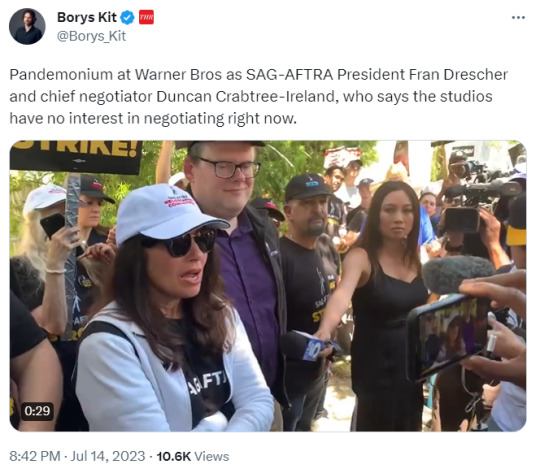
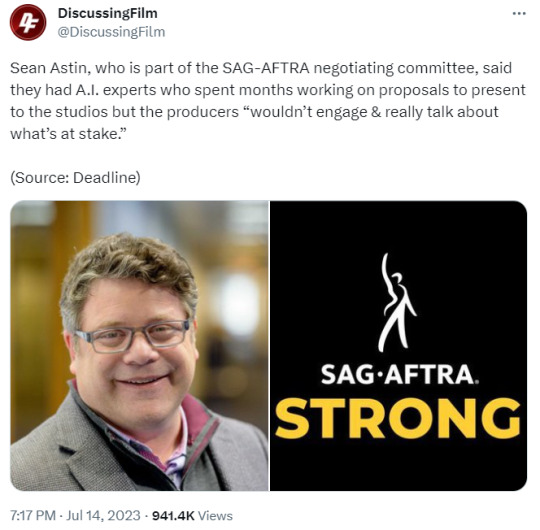
#wga strike#wga strong#sag-aftra strike#sag-aftra strong#I'm sorry for the spamming everyone but the sheer bad faith and greed of the studios is just infuriating#the sheer disrespect they've shown#fran drescher#Duncan Crabtree-Ireland#Sean Astin
6K notes
·
View notes
Text
Consent, credit and compensation.
Those were the terms that SAG-AFTRA national executive director Duncan Crabtree-Ireland and Writers Guild of America West negotiating committee member John August called for in order for guild members’ work, likenesses and brands to be used to train artificial intelligence systems. At a hearing before the Federal Trade Commission on Wednesday, they joined other representatives for various groups — including authors, voice actors and musicians — to warn of the encroachment of generative AI into the media and entertainment industries that they say undercuts their labor and presents heightened risks of fraud.
#news#sag-aftra#sag aftra#sag-aftra strike#sag aftra strike#ai#ai use#duncan crabtree ireland#duncan crabtree-ireland#us news#uspol#us pol
132 notes
·
View notes
Text
“This Was A Negotiation For The Future”: Fran Drescher & Duncan Crabtree-Ireland On SAG-AFTRA Deal, AI & Informed Consent + Importance Of CEOs
"'We know that generations from now they’ll be talking about this seminal contract and reaping the benefits of it in the way that we have been for the last 65 years with a contract that was negotiated when Ronald Reagan was in my position,' says SAG-AFTRA president Fran Drescher of the new contract the actors guild made with the studios on Wednesday after 118 days on strike.
Worth more than $1 billion over the next three years, the tentative agreement has an “extraordinary scope” and is full of “unprecedented provisions,” according to SAG-AFTRA. While the fine print won’t be made public until the 160,000-strong guild’s board votes on it Friday, we know the new deal includes increases in minimum rates, a streaming participation bonus, new health and pension caps, diversity guardrails, and hard fought for AI protection provisions.
The recently overwhelmingly reelected Drescher and chief negotiator Duncan Crabtree-Ireland were at the heart of the strike and the talks. “This strike was about people who are trying to make a middle class living, and I think when the whole deal is put out in the public and people have all the different pieces of it, they will see that there is an overall commitment to improving the economic viability of a career as an actor in this business,” Crabtree-Ireland notes.
Frequently attacked and underestimated by the AMPTP and others, both the union president and national director were out on the picket lines day after day as well as in negotiations with the CEOs Gang of Four of Netflix’s Ted Sarandos, Disney’s Bob Iger, NBCUniversal’s Donna Langley and Warner Bros Discovery’s David Zaslav. Back at the bargaining table for the second set of renewed talks starting on October 24, a month after the WGA reached their own tentative agreement with the studios, the duo, SAG-AFTRA’s chief contracts officer Ray Rodriguez and other members of the negotiating committee unanimously approved the deal Wednesday evening. That vote came as the studios had set a 5 pm PT deadline that could have seen everything go back to square one.
Today, Drescher and Crabtree-Ireland spoke with me about getting to that deal, power of the picket lines, role of the Gang of Four and the importance of the new contract for the entire industry. The duo also revealed some of the AI specifics in the new contract and the battles to come.
DEADLINE: What was the turning point that brought this deal together?
FRAN DRESCHER: We got the protections we needed in AI. We got the funds that we needed for the new revenue stream. That was the two biggest outstanding pieces.
The money was in place earlier, it was the protections that we really were holding out for. With AI, things move very fast, and three months is equivalent to a year in how things can change. So, if we didn’t close that up now then you’ll be so far behind you’ll never be able to catch up. It was really important to us, that we got the protections we felt that we absolutely needed to sustain this contract until the next one. I mean, there’s still things that we’re already working on to get for the next contract, but there are so many milestones in this one.
DUNCAN CRABTREE-IRELAND: I would say it’s been a roller coaster since we got back in the room late last month.
DEADLINE: No doubt.
CRABTREE-IRELAND: Yes, and AI has proved to be one of the most challenging topics in this negotiation from the very beginning all the way to the very end. It was on the table Day 1 and it was on the table on Day 118 of the strike.
DEADLINE: So, how did you seal that deal, so to speak?
CRABTREE-IRELAND: It’s clear that the direct engagement of CEOs was essential to reaching the deal. I think that it is also clear that the companies had to push beyond their initial comfort zone to find a path that could actually give us enough assurances that our members could say yes, we’re going to walk forward into this coming couple of years with a feeling that there is sufficient protection against any kind of abuse from the way AI is being implemented.
For me, I think the key moments really had to do with the kind of dialogue that we had directly with the CEOs, and with Carol, and our committee which has just been so strong and so united. That really gave us the power we needed. Outside the room, the other thing I would just add is having the chance to be out on picket lines in our rallies with our members. That was incredibly not only energizing for me and for the committee but also really helped us make sure we were hearing from all facets of our membership.
DEADLINE: How so?
CRABTREE-IRELAND: Because the picket lines are a very democratizing unifying place and members from all walks of life and all aspects of people’s careers, and all types of specialties are all there.
DEADLINE: In this final round of talks, one of the things that came up a lot from the studio side, but also on the picket lines, was the notion that everyone was running out of time. Running out of time to get a TV season and summer slate off the ground. Running out of time to get people back to work. As we reported yesterday, the AMPTP even gave you guys a 5 pm PT deadline Wednesday or they were going to take their ball home. How real was all that to you?
CRABTREE-IRELAND: You know, I took it as an expression of how concerned they were about this timing and that they were really trying to send us a message of the realities of their production environment – that meant that the timing was real for them. I never take a deadline like that as a given because we’re we live in a world of human beings and our committee was working as quickly as we could. So, I personally thought we were going to be ready before that anyway and we were – but, that deadline was what partially drove us. The desire to make sure that that we could make a deal as quickly as possible because of the ongoing harm that that being strike causes to workers. That’s really what drove us.
The other thing, Dominic, that I will say made it possible was the studios coming through with the final pieces in AI. We’ve made it clear to them from the very beginning and it was true all the way along: AI was existential for our members. And if we didn’t have the right protections, we weren’t going to be able to make a deal. So, I think they ultimately believed that, understood that and they did what they had to do to give us those assurances.
Also, people need know that just strike was not about celebrities per se, this strike was about working actors. This strike was about people who are trying to make a middle class living, and I think when the whole deal is put out in the public and people have all the different pieces of it, they will see that there is a overall commitment to improving the economic viability of a career as an actor in this business. And that’s really good for all of us.
DEADLINE: Fran, did you worry with the deadlines the studios were trying to impose, that this could go off the rails?
DRESCHER: Well, I didn’t know what you mean by go off the rails because it was either going to protract the strike or they were going to appreciate the gravity of certain points that really were deal breakers. About AI, I told them that to their faces: This is going to be a deal breaker, I could tell you right now.
DEADLINE: Clearly, they got the message at some point…
DRESCHER: In a negotiation, you don’t ever get everything, that’s understood. But when the opposition in a really appreciates that we are prepared to go longer, that we’re already on strike. We were prepared to go the distance on this. They heard us, so thank God.
DEADLINE: You’ve indicated you’re already thinking about down the line, the next contract. From what I know about this contract, while it is a three-year contract, this seems multigenerational and it plants pillars that are going to be a strong part of a vastly changing industry. Do you see it like that?
DRESCHER: Without question? I mean, we said that to ourselves last night when we passed this, without objection, which in itself is a historic triumph. We know that generations from now they’ll be talking about this seminal contract and reaping the benefits of it in the way that we have been for the last 65 years with a contract that was negotiated when Ronald Reagan was in my position.
DEADLINE:I know that we’re going to get more details tomorrow on AI when the board votes, but Duncan can you give us a sense now of what these protections are?
CRABTREE-IRELAND: I will say, I think our proposals are more specific than the ones that you’ve seen in other contracts because our members are experiencing the use of AI right now. This is not something that’s coming down the road. This is something that’s currently happening.
So, we do have very specific protections around the creation and use of digital replicas, including informed consent for any creation and use as well as compensation structures for how people should get paid both for the creation and use of digital replicas.
DEADLINE: How will that work?
CRABTREE-IRELAND: One way is to protect against the use of generative AI to create what we would call synthetic fakes, which are synthetic assets that are created out of potentially multiple actors inputs. Where there’s any kind of recognizable elements of that there will be protection and a right of consent, as well as a right for the union to be notified when they’re created and a right to bargain for compensation.
Really, the theme around all of this Dominic is informed consent and fair compensation
Also, I do want to just say because I know people have wondered this whole idea about zombie actors. There are now the consent requirements that apply if an actor is deceased. It wasn’t always that way during this negotiation, but where we’ve ended up is the producers will have to seek consent from the heirs or representatives of the estate of a deceased performer to get concerned for ad use of their image like this voice or performance and the creation of a digital replica, unless that consent was explicitly granted informed consent prior to the person’s death. Just with those examples, I think you can see it’s a very robust set of protections. Protections that address all of the areas of concern that we’ve raised in connection with how actors should be treated as the industry moves forward. Because, let’s be honest, nobody’s immune from evolution, and that includes the studios
DRESCHER: Also, part of the caveat of this negotiation is that the guild and the studios have agreed together to meet semi-annually so that we can always stay on the pulse of where technology is going. Because in many ways, we’re going to find ourselves on the same side fighting in Washington for a kind of legislation that protects all of us against piracy, and more.
DEADLINE: To that, on more than one occasion you guts put out stuff publicly about bullying techniques that AMPTP loves to use and has used over the years, and more How did that affect the tone in the room and or the tone in the virtual room sometimes?
CRABTREE-IRELAND: You know, it wasn’t really acknowledged directly in the room. You know, as an openly gay man, I’ve been bullied plenty in my life including as a kid, and what I’ve always found is when you call it out, that takes away some of its power.
DEADLINE: Amen.
CRABTREE-IRELAND: So, to me, if I feel like those kinds of tactics are being used, my first reaction is to just acknowledge it publicly, openly and take away the power that it has as a result. That was our approach. I will also say, I’m not sure everything is as tightly choreographed on the studio side as people would think. There are multiple companies and there are different opinions, even within their group about tactics and strategy and things like that. Even so, in the end, I think it’s important to just really be open and be direct about it. And when we were in our meetings with the CEOs, you know, I didn’t perceive that as was happening there. And nor was that topic specifically ever discussed during those meetings.
DEADLINE: One thing that was discussed, as Deadline exclusively reported at the time, was Netflix’s Ted Sarandos saying to guild leaders last weekend, once the studios had presented their so-called last, best and final offer: We didn’t just come towards you. We came all the way to you. What’s was your take on that, was it true?
CRABTREE-IRELAND: Well, I mean, I don’t think that’s correct. I think it’s a good rhetorical point and Ted is a very powerful orator and persuader, obviously, but you know, this has been a negotiation.
We started out with an admittedly aggressive side of asks in our initial proposals, and we knew we weren’t going to get everything that we were trying to achieve it just as they knew they weren’t going to get everything that they were trying to achieve. In fact, where this deal has landed. I think it’s very favorable. It’s very successful. For us, it’s groundbreaking, but it’s not everything that was in our initial proposal package, and there are battles that will have to be fought another day.
So, did they come all the way to us? No. Did they come far enough to us to make a deal that provides our members the protections that we that we really need and provides them with a level of respect to this agreement that members can be excited about? Yes, and I do appreciate them ultimately getting there, although I wish it would have happened a lot sooner.
DEADLINE: Of course, but also there was a lot of bitterness, a lot of agendas in this strike, in the negotiations and in the getting there. What do you think, if anything the studios and the AMPTP leadership learned from this half year of strikes?
CRABTREE-IRELAND: One thing I do wish, and I hope that this will take hold in the industry and future cycles of negotiation, which is if there are strikes, it’s not a good strategy to just let everyone sit there. It’s not going to wear us down. It’s just going to cause more harm to the industry and it’s unnecessary. So, hopefully in the future, there won’t be these long periods of time, like the 100 days before the studios went back in with the Writers Guild to restart talks. There shouldn’t be those kinds of time periods of no talking, because the only way to solve these problems is through discussions and negotiations
DRESCHER: As we said all along: One day longer, one day stronger.
DEADLINE: Fran, there were a lot of attacks on you, on your leadership, on your abilities – some of which you have responded to. Some of the attacks were open, many were whispering campaigns. Now, with this contract, do you feel vindicated and what would you say to those who took potshots at you?
DRESCHER: The people that know me were not surprised that I was going to rise to the occasion. Yet, I think that sadly, women in leadership positions often are faced with the lowest hanging fruit ploy, which is to find any way to discredit them. Duncan’s actions in the negotiating room were a non-issue, never discussed. For me, the pendulum swung from being you know, overly aggressive to frivolous to everything in between. But I will tell you, I merely saw that all of that as an opportunity to create a womaqn and girls movement that I can lead and be exactly me, which is what I did.
DEADLINE: It seems there was a lot of underestimating and undermining here…
CRABTREE-IRELAND: I agree. I think they didn’t think they were going to go on strike in the first place.
DRESCHER: I don’t think so either.
CRABTREE-IRELAND: This entire process has been one of the studios opening their eyes to the reality of SAG-AFTRA, its membership and its willingness to do what it takes to make sure that they’re protected.
We came in with a strike authorization vote that was unprecedented. We then tried really hard to get a negotiated deal without going on strike, including the extension, which was also unprecedented. We did that and then I really think that they believed at the end of that we were stop.
DEADLINE: But you didn’t, why?
CRABTREE-IRELAND: Because the thing was, it wasn’t good enough for our members at that point. So, we couldn’t do that and so we went on strike with the WGA. Even then, I believe that their strategy was to wear us down, but our members didn’t get worn down. Yes, everyone’s hurt the whole industry, all the workers hurt and I don’t want anyone to ever think we didn’t know that and feel that. I did, all of us did. But what we’re fighting for something that was wasn’t just a regular three-year marketing cycle, we always knew that.
DEADLINE: How did that manifest itself?
CRABTREE-IRELAND: This was a negotiation for the future. For the future of our members and our industry. And members stayed strong at our picket lines. I’d say the last few days have been as strong as ever. Our members did not get weakened. They did not get discouraged. They knew that we were fighting a battle we were going win. Ultimately the studios and the streamers had to recognize. Also, the fact that the public and the rest of the industry really did hear us when we talked about we were fighting for was great. Between us and the Writers Guild, I think the public support was extraordinary, and I think the studios had to acknowledge that as well. So, there was a lot of elements that came together to really help us get here.
DRESCHER: One thing I made sure of too was that every community and every major concern for this contract was well represented. Represented by not only our amazing staff and chief negotiator, but experts. Our experts were with us every step of the way, in all fields, and that’s why we got so many, I believe, groundbreaking new things language in the contract that never existed before. This time called for that. I’m just grateful that the AMPTP recognized where we were coming from heard us and met the moment.
CRABTREE-IRELAND: Yes, there was a lot of progress made, and the last very last thing was negotiation on the toughest issues. I guess that’s to be expected, because all of the underbrush had been cleared and all of the points that could be addressed most easily had been addressed. In the end, we did things to send signals that we were not holding on to anything that we didn’t really need. To let the AMPTP know, and see, at the end this wasn’t a case of negotiating just for everything we wanted. It was for things that our members really needed, that were really important. As the studios really started understanding that, they realized that if they wanted to have an agreement in the timeframe that they were looking for, that they would have to do something to address those needs. And they ultimately did. So, a day after we agreed on a deal, I appreciate that very much, because that is what helped us get this across the line in the end.
#long post#sag-aftra strike#sag strike#actors strike#fran drescher#duncan crabtree-ireland#hollywood strikes#fans4wga
78 notes
·
View notes
Text

chriscolfer: Congratulations and THANK YOU @/officialfrandrescher, @/duncanci, @/msjoelyfisher and the entire @/sagaftra negotiating committee! Your leadership and endurance has inspired the whole world! #sagaftra #sagaftrastrong [posted Nov 8, 2023]
41 notes
·
View notes
Text
Weekly output: satellite-to-phone services, fixed-wireless access, broadband buildout risks, 2023 broadband subscriber stats, actors negotiating for AI rights, Office Space reunion, how companies talk cybersecurity
AUSTIN–This week started with stories datelined from a city some 4,000 miles east of D.C. and ends with pieces datelined from a city about 1,300 miles southwest of home.
3/4/2024: SpaceX rivals pitch their phone-to-satellite alternatives, Light Reading
I wrote most of this piece recapping an MWC panel featuring multiple non-SpaceX satellite-to-phone services–including my Falls Church neighbors…
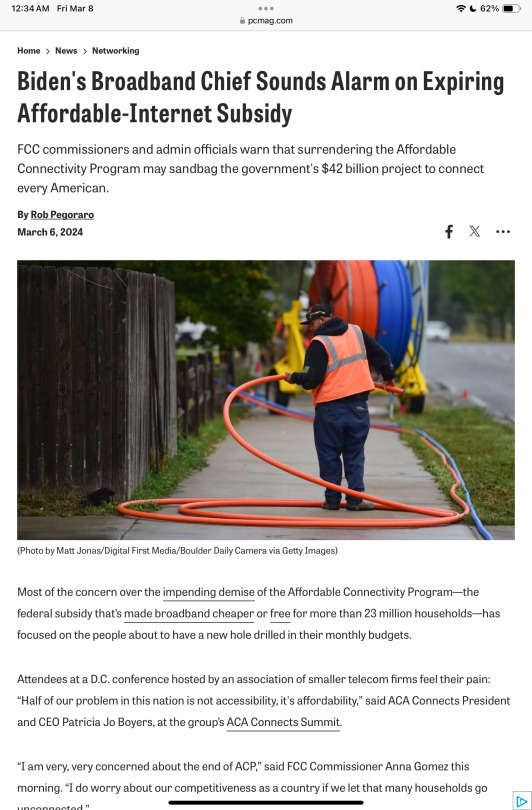
View On WordPress
#ACA Connects#actors&039; strike#Affordable Connectivity Plan#Alan Davidson#Austin#Barcelona#BEAD#cybersecurity#Duncan Crabtree-Ireland#federal broadband buildout#fixed wireless#FWA#information security#Leichtman Research Group#Lynk Global#Mobile World Congress#MWC#Office Space#OneWeb#SAG-AFTRA#Sateliot#south by southwest#sxsw#Verizon home 5G
0 notes
Text
NAVA Presents AI Panel at 2023 Los Angeles Comic Con
NAVA Presents AI Panel at 2023 Los Angeles Comic Con
This Saturday, December 2nd 2023, The National Association of Voice Actors hosts their panel with special guests from across the voice acting industry at this year’s Los Angeles Comic Con! Join them as they discuss the challenges facing voice actors in this new world of AI, machine learning, and synthetic voices. Moderated by NAVA VP Carin Gilfry and featuring:Tim Friedlander (NAVA)Duncan…

View On WordPress
#Artificial Intelligence#Carin Gilfry#Cissy Jones#Duncan Crabtree-Ireland#los angeles comic con#Morla Gorrondona#National Association of Voice Actors#Rachel Slotky#SAG-AFTRA#Tim Friedlander#Torian Brackett#Voice Acting#voice actor
0 notes
Text
Actors stop working
In the negotiations with the major film studios, no agreement was reached before a deadline had expired. Now follows a strike in the acting industry.
After failed negotiations with the major US film studios, Hollywood actors went on strike. The executive board of the Screen Actors Guild (SAG-AFTRA) voted unanimously Thursday to call for a walkout, chief negotiator Duncan Crabtree-Ireland…
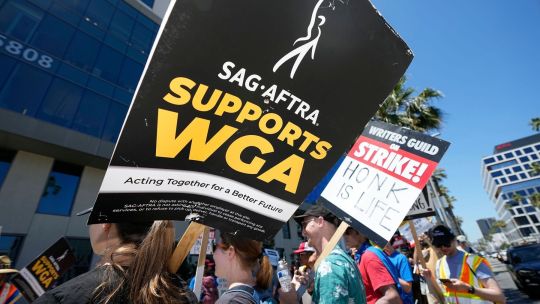
View On WordPress
#acting industry#Duncan Crabtree-Ireland#Film studio#Glenn Close#Hollywood#Jennifer Lawrence#Meryl Streep#negotiation#SAG#Strike#The Angels#TO#unions
0 notes
Text

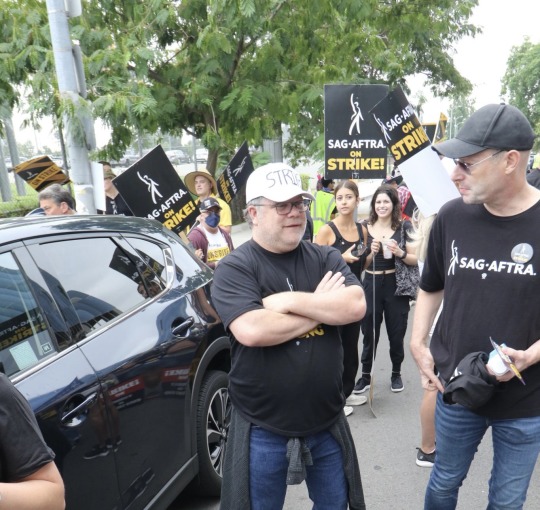
You’d be forgiven for thinking SAG-AFTRA’s negotiating committee was actually a film cast playing a negotiating committee. The group backing up Crabtree-Ireland in the talks is, naturally, full of actors, including Sean Astin, the “Lord of the Rings,” “Goonies” and “Stranger Things” star whose mother, Patty Duke, was president of the guild in the 1980s.
Astin gave a shout out to his mom, who died in 2016, at an August 22 rally.
“Any background actors out there, any stunt performers, singers and dancers and puppeteers and pilots? We represent all of you,” Astin shouted. “I invoke the name of my mother Patty Duke, former president of the Screen Actors Guild, mama come down here right now and look at these people!”
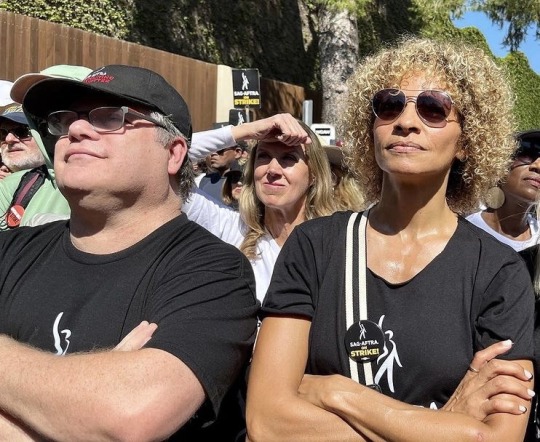
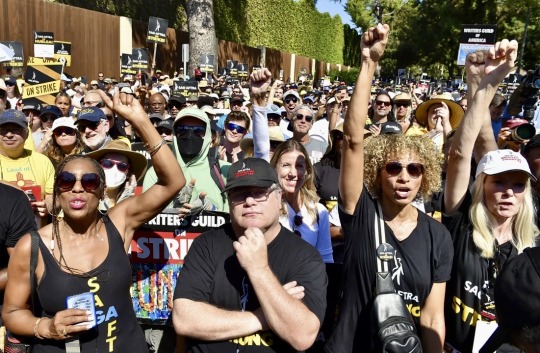
#sean astin#sag aftra#sag after strong#sag afra strike#union strong#fran drescher#duncan crabtree ireland#wga solidarity#wga strong
79 notes
·
View notes
Text
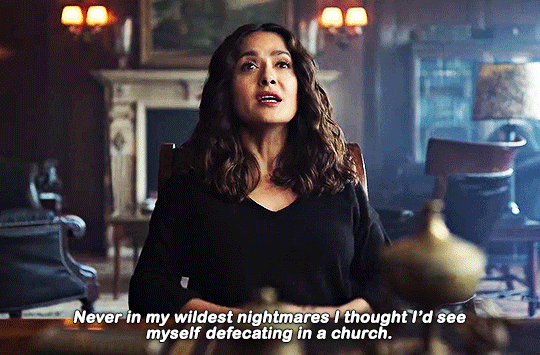
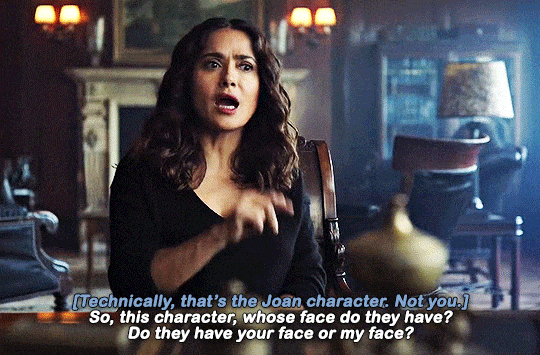

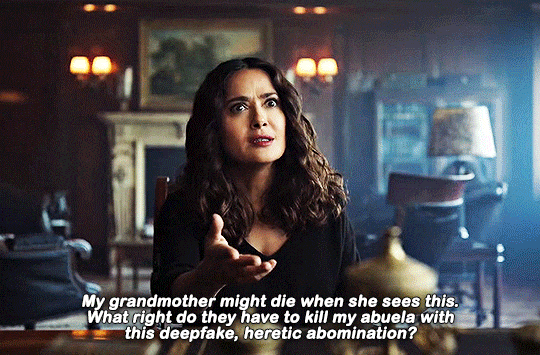


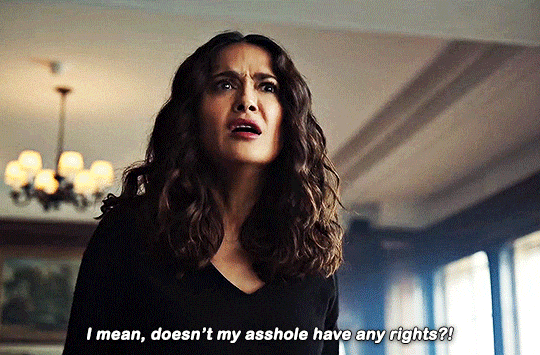
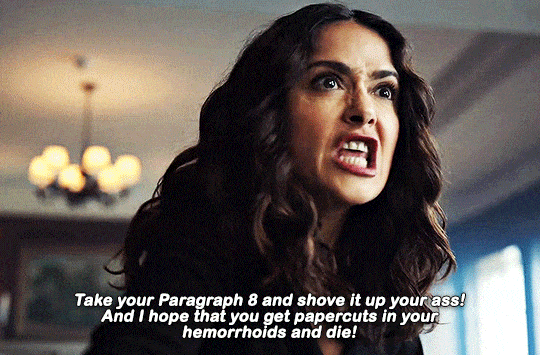
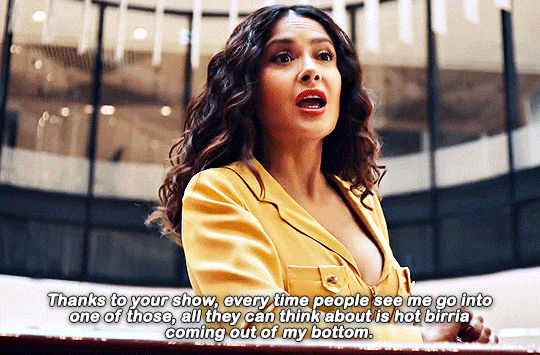
Reader, it has happened already. Less than a month after it debuted, the Black Mirror episode Joan Is Awful has already become the unlikely figurehead of the strike.
It's the story of a woman who, at the end of each day, realises with horror that her actions have been folded into a Dropout-style biographical drama, where all her bad traits and regrettable decisions are played out onscreen by Salma Hayek. Except, as the episode goes along, we learn that it isn’t Hayek at all; it’s an AI-generated likeness of Hayek, commissioned by unethical executives working for a monolithic streaming platform.
It couldn’t be more timely. A sticking point of the Sag-Aftra strike is the potential that AI could soon render all screen actors obsolete. Chief negotiator Duncan Crabtree-Ireland laid bare the AMPTP’s so-called “groundbreaking AI proposal,” which holds the potential to wipe out an entire pathway to breaking into the industry, as well as a reliable source of income for many. The reported proposal hinged on the ability for background actors to be “scanned, get paid for one day’s pay” and for that company to “own that scan of their image, their likeness, and to be able to use it for the rest of eternity in any project they want with no consent and no compensation.”
It’s a similar line to the one currently taken by the striking WGA writers. Eventually, they claim, technology will advance enough to make an AI-generated script that is indistinguishable from one created by a human. These scripts would be cheap and instant, and – even though they’re essentially composite jobs, made by scraping existing scripts – they would immediately put an entire profession out of work.
fellas, we're really in it (a black mirror episode) now
#salma hayek was RIVETING in this#black mirror#black mirror spoilers#salma hayek#sag strike#wga strike#screen actors guild#sag-aftra#writers strike#writer's guild of america#ai#long post
5K notes
·
View notes
Quote
Talks collapsed on Wednesday night between studios and SAG-AFTRA following the guild’s revenue share proposal that would cost the companies less than 57¢ per subscriber annually. The studios balked exclaiming that SAG-AFTRA’s ask was an “untenable economic burden” which would cost them more than $2.4 billion over the course of a new three-year contract or more than $800 million per year. On Thursday, Sarandos at Bloomberg’s Screentime event called the SAG-AFTRA proposal a “levy on subscribers on top of [other] areas” as well as a “bridge too far”.
Following Wednesday talks, SAG-AFTRA said the studios “intentionally misrepresented to the press the cost of the above proposal – overstating it by 60%. They have done the same with A.I., claiming to protect performer consent, but continuing to demand ‘consent’ on the first day of employment for use of a performer’s digital replica for an entire cinematic universe (or any franchise project).”
SAG-AFTRA Chief Negotiator and National Executive Director Duncan Crabtree-Ireland is very happy with Taylor Swift and not so happy with Netflix co-CEO Ted Sarandos.
Just as they did with WGA, AMPTP walked into a negotiation, delivered a lecture, and stormed out like spoiled children. Then they lied about it.
SAG-AFTRA is ready and willing to negotiate and make a deal. It is the billionaires who own the studios and streamers who refuse.
1K notes
·
View notes
Text
SAG-AFTRA signed a deal on Tuesday with an AI voiceover studio that sets terms for the use of artificial intelligence in video games.
The union announced the deal with Replica Studios on Tuesday at CES in Las Vegas. Duncan Crabtree-Ireland, the union’s executive director, said that the terms include informed consent for the use of AI to create digital voice replicas, as well as requirements for the safe storage of digital assets.
At a press conference, Crabtree-Ireland said the union wants to channel emerging technology to benefit performers — rather than trying to stand in the way.
“These are the kind of terms that producers can agree to without disrupting their ability to make content,” Crabtree-Ireland said. “This is an evolutionary step forward. AI technology is not something we can block. It’s not something we can stop. That’s not a tactic or a strategy that’s ever worked for labor in the past.”
AI was a major issue in the 2023 SAG-AFTRA strike. The union ultimately reached a deal with the major studios — represented by the Alliance of Motion Picture and Television Producers — that established consent and compensation requirements for the use of AI to replicate actors’ likenesses. The deal did not block studios from training AI systems to create “synthetic” actors that bear no resemblance to real performers.
#news#sag aftra#sag-aftra#sag aftra strike#sag-aftra strike#duncan crabtree ireland#duncan crabtree-ireland#ai use#ai generation
26 notes
·
View notes
Text
SAG-AFTRA, Teamsters, IATSE, Writers Guild Issue Joint Statement in Solidarity with Directors Guild of America
May 31, 2023
Los Angeles, CA — As the Directors Guild of America’s negotiations with the Alliance of Motion Picture and Television Producers (AMPTP) enter their final scheduled week, the International Alliance of Theatrical Stage Employees (IATSE), the Teamsters, Hollywood Basic Crafts (Teamsters Local 399, IBEW Local 40, LiUNA! Local 724, OPCMIA Local 755 and UA Local 78), the Writers Guild of America East (WGAE), the Writers Guild of America West (WGAW), and the Screen Actors Guild-American Federation of Television and Radio Artists (SAG-AFTRA) stand alongside our sisters, brothers, and kin in the DGA in their pursuit of a fair contract.
We believe in a Hollywood where every worker is valued and their contributions recognized, whether their labor is on or off screen. A fair contract for directors does not benefit just a select few; it uplifts every worker in the film and television industry and acknowledges the interconnected nature of our work. We call on the AMPTP to immediately negotiate a fair agreement that addresses the Directors Guild of America’s unique priorities in good faith.
As eyes around the world again turn towards the negotiation table, we send a clear message to the AMPTP: Our solidarity is not to be underestimated. The Hollywood guilds and unions stand united, and we stand strong.
In solidarity,
Matthew D. Loeb
International President, IATSE
Lindsay Dougherty
Motion Picture Division Director & Western Region Vice President, Teamsters
Hollywood Basic Crafts, Chairperson
Duncan Crabtree-Ireland
National Executive Director and Chief Negotiator, SAG-AFTRA
Michael Winship
President, Writers Guild of America, East
Meredith Stiehm
President, Writers Guild of America West
2K notes
·
View notes
Text
Before anyone thinks that the SAG-AFTRA should have accepted the deal that included “a groundbreaking AI proposal that protects actors’ digital likenesses, and more” I would like you to read this quote from the chief negotiator Duncan Crabtree-Ireland
“They propose that our background performers should be able to be scanned, get paid for one day's pay, and their company should own that scan of their image, their likeness, and should be able to use it for the rest of eternity. If you think that's a ground-breaking proposal, I suggest you think again.”
And a comment from the AMPTP (the studios)
“The union has regrettably chosen a path that will lead to financial hardship for countless thousands of people who depend on the industry”
Both quotes are from this BBC article.
The same group of people saying that the strike will cause financial hardships for thousands of people is suggesting they get a single days pay for getting digitally scanned. Afterwards said scan will be used to do the work the actor should be getting paid for.
#do not let these billion dollar companies convince you the union is responsible for anything following this negotiation#actors strike#writers strike#SAG-AFTRA strike#sag aftra#sag aftra strong#wga strike#sag aftra strike#wga strong#sag strike
580 notes
·
View notes
Text
The productions agree to abide by the terms of the latest offer submitted by SAG-AFTRA during contract negotiations. Ultimately, the productions will adhere to the final deal negotiated by the AMPTP.
Duncan Crabtree-Ireland, the union’s executive director, said on a conference call Tuesday that actors are actively encouraged to participate in such projects.
He said if independent productions are able to move forward on the union’s terms, that undermines the studio talking point that the union’s demands are “unrealistic.”
#sag strike#wga strike#sag aftra strike#i could be wrong but I really think this will be a golden age for indie films
345 notes
·
View notes
Text
Actors and writers want fans to help their Hollywood strike. Here’s how.
How are strikers encouraging audiences to get involved?
SAG-AFTRA and WGA members have used social media to spread information about the strike, detailing how viewers can support entertainment workers’ demands for higher minimum pay, improved safety and more streaming residuals. Among their recommendations for aiding the strike efforts are sharing, liking and commenting on posts about the recently expired SAG-AFTRA contract because “actors are working people just like everyone else.”
“There’s a lot of misconception that our union is about stars and celebrities,” said Duncan Crabtree-Ireland, SAG-AFTRA’s national executive director and chief negotiator.
Most of the guild’s 160,000 members, he said, are “working actors who are trying to make a living, pay their bills, pay their rent.”
Actors and writers are encouraging fans to join the picket line in their local area to increase strike visibility. They say people can bring signs, water and snacks to picketers. Union-allied organizations such as the Directors Guild of America, the International Brotherhood of Teamsters and the International Alliance of Theatrical Stage Employees, Moving Picture Technicians, Artists and Allied Crafts of the United States have thrown their support behind the strike effort in person and online, joining a broader coalition of unions pushing against mistreatment in the workplace.
Crabtree-Ireland said strike supporters could aid the effort by amplifying the union’s demands with social media posts and donations to fundraisers for SAG-AFTRA members. Boycotting projects made by the AMPTP is not the priority, he added.
“We’re not at this time calling for a boycott of anybody. Our focus is on shutting down production. … But that’s not to say that that won’t be something we do in the future,” he said.
How can entertainment workers receive financial support during the strike?
Several organizations have committed to supporting members of SAG-AFTRA and the WGA. Some of the most prominent funds are SAG-AFTRA’s Entertainment Community Fund and nonaffiliated crowdsourced fundraisers like the Union Solidarity Coalition Fund, Groceries for Writers and the Snacklist.
The fundraisers say they provide resources that include mental health support, health insurance, counseling, career resources, budgeting tips and grocery aid.
Fowlkes, T. 2023. "Actors and writers want fans to help their Hollywood strike. Here's how." The Washington Post, July 17. <washingtonpost.com/arts-entertainment/2023/07/17/actors-strike-what-can-fans-do/>
200 notes
·
View notes
Text
During today’s press conference in which Hollywood actors confirmed that they were going on strike, Duncan Crabtree-Ireland, SAG-AFTRA’s chief negotiator, revealed a proposal from Hollywood studios that sounds ripped right out of a Black Mirror episode.
In a statement about the strike, the Alliance of Motion Picture and Television Producers (AMPTP) said that its proposal included “a groundbreaking AI proposal that protects actors’ digital likenesses for SAG-AFTRA members.”
When asked about the proposal during the press conference, Crabtree-Ireland said that “This ‘groundbreaking’ AI proposal that they gave us yesterday, they proposed that our background performers should be able to be scanned, get one day’s pay, and their companies should own that scan, their image, their likeness and should be able to use it for the rest of eternity on any project they want, with no consent and no compensation. So if you think that’s a groundbreaking proposal, I suggest you think again.”
172 notes
·
View notes